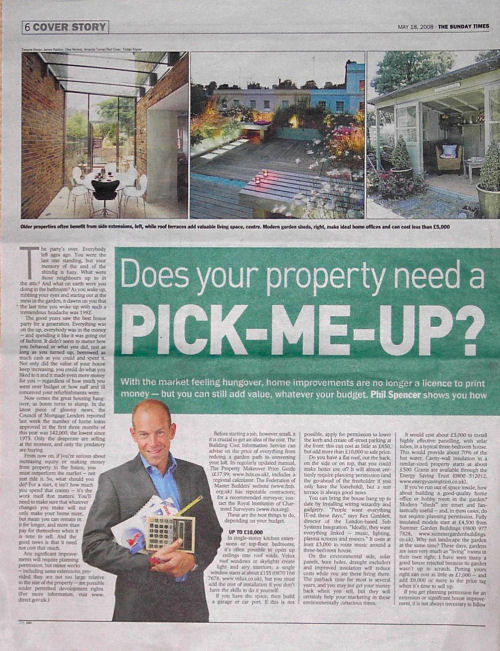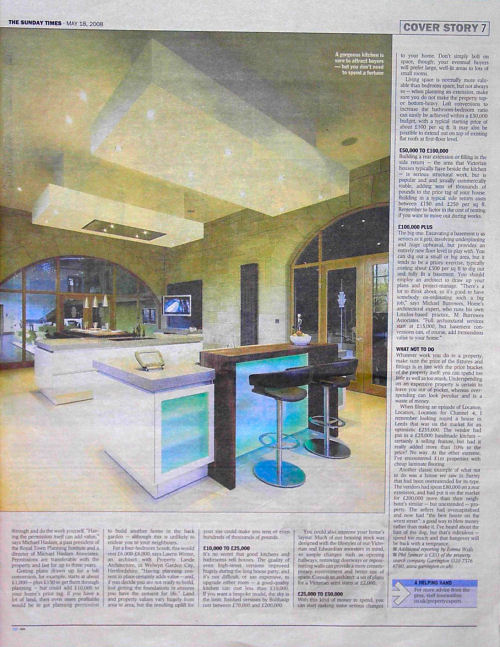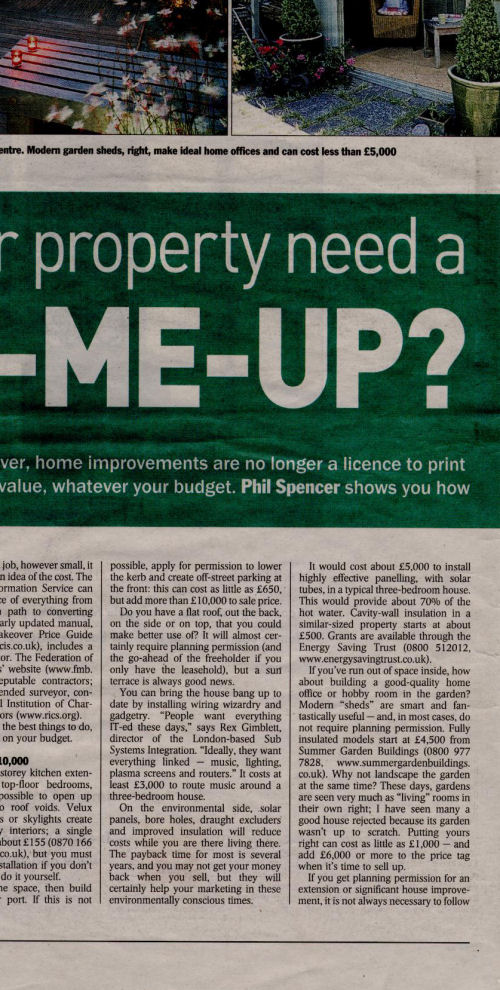Click this messge to hide it.
Front cover story written by Phil Spencer
DOES YOUR PROPERTY NEED A PICK ME UP?
" . . . The good years saw the best house party for a generation. Everything was on the up, everybody was in the money - and spending it like it was going out of fashion . . . "
" . . . Now comes the great housing hangover, as boom turns to slump . . . "
" . . . So, what should you do? . . . "
" . . . And the good news is that it need not cost that much . . . "
" . . . Modern garden sheds make ideal home offices and can cost less than £5,000 . . . "
" . . . If you've run out of space inside, how about building a good-quality home office or hobby room in the garden? Modern "sheds" are smart and fantastically useful - and, in most cases, do not require planning permission. Fully insulated models start at £4,500 from Summer Garden Buildings (www.summergardenbuildings.co.uk) . . . "
Scroll down to see a full transcript of this article or click here to see the article at www.timesonline.co.uk
Front cover of The Sunday Times Home Supplement 18th May 2008

Page 6 of The Sunday Times Home Supplement 18th May 2008

Page 7 of The Sunday Times Home Supplement 18th May 2008

Close up view of Page 6 of The Sunday Times Home Supplement 18th May 2008

FULL TRANSCRIPT
Does your property need a pick-me-up?
With the market feeling hungover, home improvements are no longer a licence to print money - but you can still add value, whatever your budget
The party's over. Everybody left ages ago. You were the last one standing, but your memory of the end of the shindig is hazy. What were those neighbours up to in the attic? And what on earth were you doing in the bathroom? As you wake up, rubbing your eyes and staring out at the mess in the garden, it dawns on you that the last time you woke up with such a tremendous headache was 1992.
The good years saw the best house party for a generation. Everything was on the up, everybody was in the money - and spending it like it was going out of fashion. It didn't seem to matter how you behaved or what you did, just as long as you turned up, borrowed as much cash as you could and spent it. Not only did the value of your house keep increasing, you could do what you liked to it and it made even more money for you - regardless of how much you went over budget or how naff and ill conceived your refurbishments were.
Now comes the great housing hangover, as boom turns to slump. In the latest piece of gloomy news, the Council of Mortgage Lenders reported last week the number of home loans approved in the first three months of this year was 142,000, the lowest since 1975. Only the desperate are selling at the moment, and only the predatory are buying. From now on, if you're serious about increasing equity or making money from property in the future, you must outperform the market - not just ride it. So, what should you do? For a start, it isn't how much you spend that counts - it's the work itself that matters. You'll need to make sure that whatever changes you make will not only make your home nicer, but mean you can remain in it for longer, and more than pay for themselves when it is time to sell. And the good news is that it need not cost that much.
Any significant improvements will require planning permission, but minor works - including some extensions, provided they are not too large relative to the size of the property - are possible under permitted development rights. (For more information, visit www.direct.gov.uk.) Before starting a job, however small, it it is crucial to get an idea of the cost. The Building Cost Information Service can advise on the price of everything from redoing a garden path to converting your loft. Its regularly updated manual, The Property Makeover Price Guide (£17.99; www.bcis.co.uk), includes a regional calculator. The Federation of Master Builders' website (www.fmb.org.uk) has reputable contractors; for a recommended surveyor, contact the Royal Institution of Chartered Surveyors (www.rics.org).
These are the best things to do, depending on your budget.
UP TO £10,000
In single-storey kitchen extensions or top-floor bedrooms, it's often possible to open up ceilings into roof voids. Velux roof windows or skylights create light and airy interiors; a single window starts at about £155 (0870 166 7676, www.velux.co.uk), but you must add the cost of installation if you don't have the skills to do it yourself.
If you have the space, then build a garage or car port. If this is not possible, apply for permission to lower the kerb and create off-street parking at the front: this can cost as little as £650, but add more than £10,000 to sale price.
You can bring the house bang up to date by installing wiring wizardry and gadgetry. "People want everything IT-ed these days," says Rex Gimblett, director of the London-based Sub Systems Integration. "Ideally, they want everything linked - music, lighting, plasma screens and routers." It costs at least £3,000 to route music around a three-bedroom house.
On the environmental side, solar panels, bore holes, draught excluders and improved insulation will reduce costs while you are there living there. The payback time for most is several years, and you may not get your money back when you sell, but they will certainly help your marketing in these environmentally conscious times.
It would cost about £5,000 to install highly effective panelling, with solar tubes, in a typical three-bedroom house. This would provide about 70% of the hot water. Cavity-wall insulation in a similar-sized property starts at about £500. Grants are available through the Energy Saving Trust (0800 512012, www.energysavingtrust.co.uk).
If you've run out of space inside, how about building a good-quality home office or hobby room in the garden? Modern "sheds" are smart and fantastically useful - and, in most cases, do not require planning permission. Fully insulated models start at £4,500 from Summer Garden Buildings (www.summergardenbuildings.co.uk). Why not landscape the garden at the same time? These days, gardens are seen very much as "living" rooms in their own right; I have seen many a good house rejected because its garden wasn't up to scratch. Putting yours right can cost as little as £1,000 - and add £6,000 or more to the price tag when it's time to sell up.
If you get planning permission for an extension or significant house improvement, it is not always necessary to follow through and do the work yourself. "Having the permission itself can add value," says Michael Haslam, a past president of the Royal Town Planning Institute and a director of Michael Haslam Associates. Permissions are transferable with the property and last for up to three years.
Getting plans drawn up for a loft conversion, for example, starts at about £1,000 - plus £150 to get them through planning - but could add £10,000 to your home's price tag. If you have a lot of land, then even more profitable would be to get planning permission to build another home in the back garden - although this is unlikely to endear you to your neighbours.
For a four-bedroom house, this would cost £6,000-£8,000, says Lawrie Winter, an architect with Property Lande Architecture, in Welwyn Garden City, Hertfordshire. "Having planning consent in place certainly adds value - and, if you decide you are not ready to build, just getting the foundations in ensures you have the consent for life." Land and property values vary hugely from area to area, but the resulting uplift for your site could make you tens or even hundreds of thousands of pounds.
£10,000 TO £25,000
It's no secret that good kitchens and bathrooms sell houses. The quality of even high-street versions improved hugely during the long house party, and it's not difficult, or too expensive, to upgrade either room - a good-quality kitchen can cost less than £10,000. If you want a bespoke model, the sky is the limit: finished versions by Bulthaup cost between £70,000 and £200,000.
You could also improve your home's layout. Much of our housing stock was designed with the lifestyles of our Victorian and Edwardian ancestors in mind, so simple changes such as opening hallways, removing doorways or repositioning walls can provide a more contemporary environment and better use of space. Consult an architect: a set of plans for a Victorian semi starts at £2,000.
£25,000 TO £50,000
With this kind of money to spend, you can start making some serious changes to your home. Don't simply bolt on space, though: your eventual buyers will prefer large, well-lit areas to lots of small rooms.
Living space is normally more valuable than bedroom space, but not always so - when planning an extension, make sure you do not make the property top- or bottom-heavy. Loft conversions to increase the bathroom-bedroom ratio can easily be achieved within a £50,000 budget, with a typical starting price of about £100 per sq ft. It may also be possible to extend out on top of existing flat roofs at first-floor level.
£50,000 TO £100,000
Building a rear extension or filling in the side return - the area that Victorian houses typically have beside the kitchen - is serious structural work, but is popular and and usually commercially viable, adding tens of thousands of pounds to the price tag of your house. Building in a typical side return costs between £150 and £250 per sq ft. Remember to factor in the cost of renting if you want to move out during works.
£100,000 PLUS
The big one. Excavating a basement is as serious as it gets, involving underpinning and huge upheaval, but provides an entirely new floor level to play with. You can dig out a small or big area, but it tends to be a pricey exercise, typically costing about £300 per sq ft to dig out and fully fit a basement. You should employ an architect to draw up your plans and project-manage. "There's a lot to think about, so it's good to have somebody co-ordinating such a big job," says Michael Burrowes, Home's architectural expert, who runs his own London-based practice, M Burrowes Associates. "Full architectural services start at £15,000, but basement conversions can, of course, add tremendous value to your home."
WHAT NOT TO DO
Whatever work you do to a property, make sure the price of the fixtures and fittings is in line with the price bracket of the property itself: you can spend too little as well as too much. Underspending on an expensive property is certain to leave you out of pocket, whereas overspending can look peculiar and is a waste of money.
When filming an episode of Location, Location, Location for Channel 4, I remember looking round a house in Leeds that was on the market for an optimistic £235,000. The vendor had put in a £25,000 handmade kitchen - certainly a selling feature, but had it really added more than 10% to the price? No way. At the other extreme, I've encountered £1m properties with cheap laminate flooring.
Another classic example of what not to do was a house we saw in Surrey that had been overextended for its type. The vendors had spent £80,000 on a rear extension, and had put it on the market for £200,000 more than their neighbour's similar - but unextended - property. The sellers had overcapitalised and now had "the best house on the worst street": a good way to blow money rather than make it. I've heard about the hair of the dog, but that's ridiculous - spend too much and that hangover will be back with a vengeance.
Additional reporting by Emma Wells
Phil Spencer is CEO of the property search company Garrington (020 7376 6780, www.garrington.co.uk)

